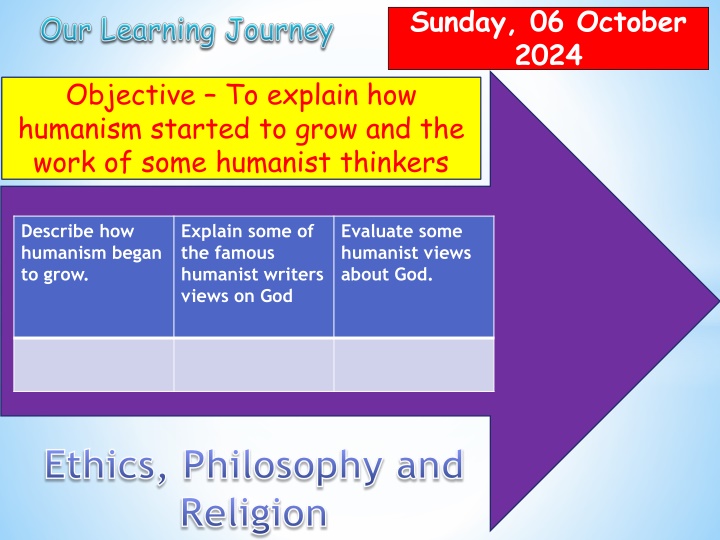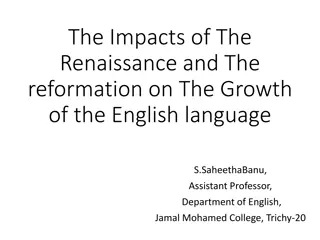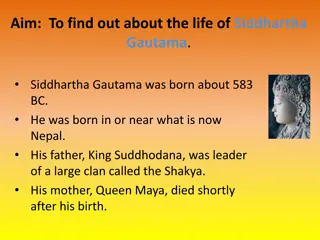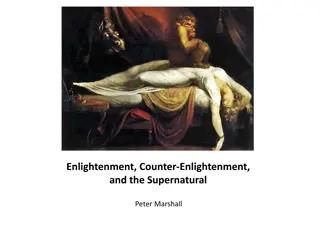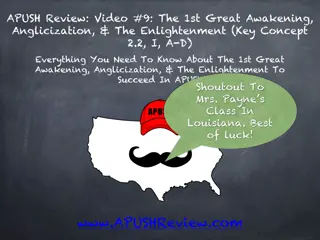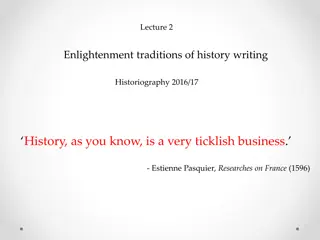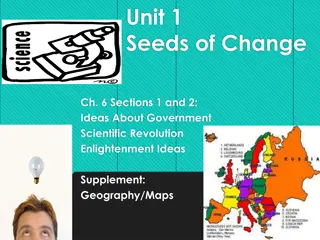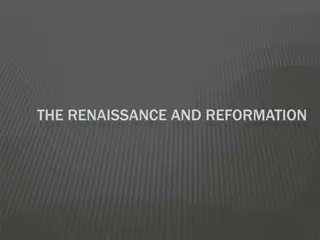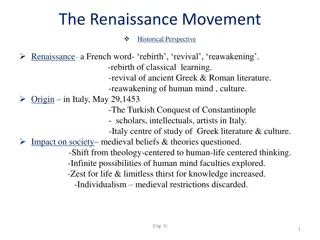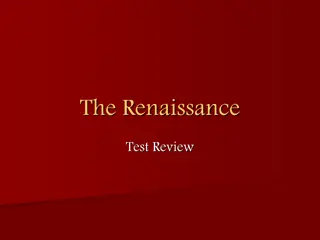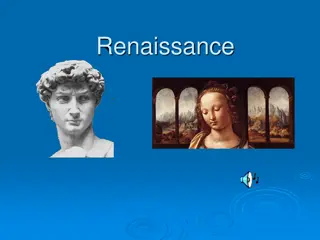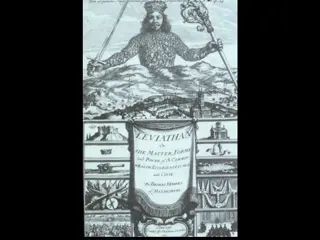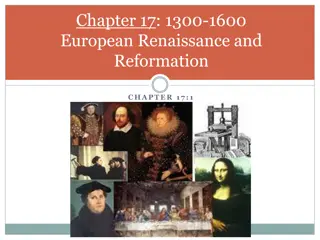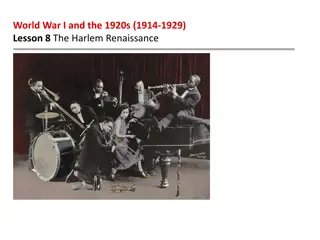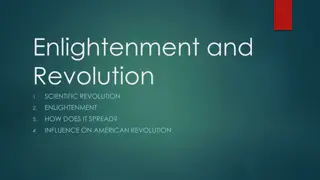The Growth of Humanism: From Renaissance to Enlightenment
Humanism began to flourish during the Renaissance and the Enlightenment periods, challenging traditional religious beliefs and emphasizing the value of human reason, rights, and autonomy. Influential humanist thinkers questioned the authority of the Church, valued human creativity, and promoted individual interpretation of philosophical ideas. The shift from a reliance on religion for answers to embracing scientific discoveries and humanistic principles marked a significant intellectual evolution in Western history.
Download Presentation

Please find below an Image/Link to download the presentation.
The content on the website is provided AS IS for your information and personal use only. It may not be sold, licensed, or shared on other websites without obtaining consent from the author.If you encounter any issues during the download, it is possible that the publisher has removed the file from their server.
You are allowed to download the files provided on this website for personal or commercial use, subject to the condition that they are used lawfully. All files are the property of their respective owners.
The content on the website is provided AS IS for your information and personal use only. It may not be sold, licensed, or shared on other websites without obtaining consent from the author.
E N D
Presentation Transcript
Sunday, 06 October 2024 Objective To explain how humanism started to grow and the work of some humanist thinkers Describe how humanism began to grow. Explain some of the famous humanist writers views on God Evaluate some humanist views about God. Ethics, Philosophy and Religion
The growth of Humanism For a long time people believed that religion had the answers to life's big philosophical questions. During a period of time called the Renaissance (1300-1700) people started to study and rediscover the writings of ancient philosophers which had largely been forgotten, this lead to people starting to understanding things differently. After the renaissance came the Enlightenment or the Age of Reason (1700-1800) where people began make huge scientific discoveries in the fields of biology, astronomy and mathematics. They began to consider human rights for the first time and the right of people to choose their own government or leader rather than just accept the absolute power of the monarch. Whilst many of these early scientists were still theists (believers) some did begin to question the Church and its teachings. They wanted to make sense of the world for themselves with out being told what to think by Church leaders. The Bible was translated into the language of the people for the first time so that normal people, not just priests and religious leaders could read it for them selves and interpret it freely. Some of these early humanists also started to value the humans as a creative and thoughtful beings not just a creation of God. They started to believe that humans could be good people, and important in their own right with out having to follow the rules of God. Speaking against God was still a very brave thing to do, blasphemy at that time, was a crime with very severe punishments including death (until 1676) In the UK blasphemy was still a crime right up until 2008 but people were very rarely convicted. The last person convicted was in early in the 19th Century.
https://www.youtube.com/watch?v=ddVc JT63LrE *The growth of Humanism
https://www.youtube.com/watch?v=K7q5 oT-X_PI *The growth of Humanism
* 1. What was the renaissance? *2. What was another word for the enlightenment? *3. Before the enlightenment where did people get all their answers from to philosophical questions? *4. How did people start to change how they thought? *5. What does absolute power of the monarch mean? * 6. Why was it a brave thing to do challenge the Church? *7. What was blasphemy? *8. What year were the blasphemy laws technically abolished. *Quick quiz
* 1. What was the renaissance? *2. What was another word for the enlightenment? *3. Before the enlightenment where did people get all their answers from to philosophical questions? *4. How did people start to change how they thought? *5. What does absolute power of the monarch mean? * 6. Why was it a brave thing to do challenge the Church? *7. What was blasphemy? *8. What year were the blasphemy laws technically abolished. *Quick quiz
Sunday, 06 October 2024 Objective To Explain how humanism start to grow and the work of some humanist thinkers Describe how humanism began to grow. Explain some of the famous humanist writers views on God Evaluate some humanist views about God. Ethics, Philosophy and Religion
Read these quotes and then summarise the points they make in three bullet points. George Eliot Wear a smile and have friends; wear a scowl and have wrinkles. What do we live for if not to make the world less difficult for each other? Isaiah Berlin As for the meaning of life, I do not believe it has any. I do not at all ask what it is, but I suspect that it has none and this is a source of great comfort to me. We make of it what we can and that is all there is about it. Claire Rayner 1._______________________ _________________________ I believe in living, the enjoyment of being, the fulfilment of our powers, the wonders of nature, the marvels of the cosmos. We don t have to bother ourselves too much about what lies behind it all. It s there. We are here. What is, is. Our job is to get on with things, trying to make life better as we go. 2._______________________ _________________________ 3. _______________________ _________________________ 1._______________________________ 1. _______________________________ 2._______________________________ 2. _______________________________ 3._______________________________ 3. _______________________________
Wear a smile and have friends; wear a scowl and have wrinkles. What do we live for if not to make the world less difficult for each other? Mary Ann Evans (George Eliot), 19th century novelist and journalist.
I believe in living, the enjoyment of being, the fulfilment of our powers, the wonders of nature, the marvels of the cosmos. We don t have to bother ourselves too much about what lies behind it all. It s there. We are here. What is, is. Our job is to get on with things, trying to make life better as we go. Claire Rayner, writer and broadcaster.
As for the meaning of life, I do not believe it has any. I do not at all ask what it is, but I suspect that it has none and this is a source of great comfort to me. We make of it what we can and that is all there is about it. Isaiah Berlin, philosopher (1909 - 1997), in a letter.
Sunday, 06 October 2024 Objective To Explain how humanism start to grow and the work of some humanist thinkers Describe how humanism began to grow. Explain some of the famous humanist writers views on God Evaluate some humanist views about God. Ethics, Philosophy and Religion
Paired work You are going to complete the information table by becoming experts in either: Einstein, Darwin, Hume, Feuerbach 1. Using the information sheet you have been given, in pairs you need to become experts in your humanist thinker. 2. Fill in your own section of the table. 3. Fill in the rest of the table by finding another pair who are experts in a different thinker and interviewing them.
What are the key words or key phrases in his idea? What do they say about God/What is the main point of their argument? Charles Darwin Albert Einstein David Hume Ludwig Feuerbach
What are the key words or key phrases in his idea? What argument does he make about God? / what is the main point of their argument? TAG Task Is it a strong argument? Why? Charles Darwin Albert Einstein David Hume Ludwig Feuerbach
What are the key words or key phrases in his idea? Natural selection, variation,environment On the Origins of Species What do they say about God/What is the main point of their argument? Charles Darwin God could not have created humans on the sixth day of creation because they are the result of millions of years of evolution Albert Einstein Reason evidence, god not necessary, argue against a good god Why is their evil in the world if God is all powerful and all loving. Maybe he is not powerful, or he is not good. If he is not powerful or good why do we call him God? Miracles are very unlikely to be true because they go against our experiences and knowledge of the world. Some one who thinks they have seen a miracle is probably lying or has been mistaken/tricked Humans create God based on their own inner feelings about what is good and right. They mistakenly think these things are from God but they are in fact from themselves, it is their human nature. David Hume Against miracles experience, observing, lying, Ludwig Feuerbach God really just our selves, human nature
Its like confessing to a murder, wrote Darwin about his book On the Origin of Species by Natural Selection . To explain Darwin s hypothesis of natural selection imagine the following: white and speckled brown moths live in a birch wood, where the trees are white and brown. Each moth has a 50% chance of being eaten by birds. Then the forest is cut down and a factory is built with brown walls. All the white moths are eaten, but the brown moths survive. Darwin argued that the plants and animals that survive are those that are best suited to their environment. If the environment changes then some animals may die while others, with a slight variation which by chance suits the new environment, survive, reproduce, and give rise to new species. In 1859, when On the Origin of Species was published, most people believed that God had designed each species during the six days of creation described in the Bible. This is what Darwin meant by the old argument from design in nature . Darwin was a gentle, quiet man who hated arguments. He knew that natural selection would be a devastating blow to traditional Christian beliefs. According to Darwin's theory humans could not have been created as described in the Bible. *Charles Darwin
Albert Einstein (born in 1879) described himself as a deeply religious man, yet also said he could not conceive of [imagine] a God who rewards and punishes his creatures . What did he mean? Einstein was a genius of physics and maths who spent his life using reason and evidence to find out how the world works. He used information about the movements of the stars and planets to explain what gravity is. Einstein said he was using reason and evidence to discover the mystery , radiant beauty and marvellous structure of reality. The traditional idea of God was simply not necessary to him. In the quote from Einstein here, Einstein argues against the idea of a good god. Is God willing to prevent evil, but not able? Then he is not omnipotent (If God is willing to stop bad things but he is not able too then he is not all powerful) Is he able, but not willing? Then he is malevolent. (is he able to but does not want to then he is evil) Is he both able and willing? Then whence cometh evil? (if he can stop evil and is willing to stop evil then why is there evil in the world?) Is he neither able nor willing? Then why call him God? (if he is not able to stop evil and does not want too anyway then why call him God at all?) This argument was also made by an ancient Epicurus almost 2,500! *Albert Einstein
Ludwig Feuerbach, a German philosopher born in 1804. Feuerbachs writings were translated into English by Mary Ann Evans, the famous novelist and humanist, whose pen-name was George Eliot. He argued that God is a human dream. God is really just ourselves - our own thoughts, our own values, our own nature. When people think about God, they are really thinking about themselves. What people think of as God is in fact our own human nature. Feuerbach said Whatever is God to a man, that is his heart and soul . This argument was also made by the ancient Xenophanes over 2,500 years ago. *Ludwig Feuerbach
David Hume, a Scottish philosopher born in 1711, liked good company, a good laugh, and a good argument. He argued against miracles like this: It is far more likely that a person who talks about a miracle is lying, than that the miracle actually happened. When anyone tells me, that he saw a dead man restored to life, I immediately [wonder] whether it be more probable that this person should either deceive (lie) or be deceived(been tricked), or that the fact should really have happened . Hume said that we know what is true from our experience and from observing (looking at) the world. Miracles do not make sense because they go against everything that we know and understand about the world, therefore they are highly unlikely to be true. http://2.bp.blogspot.com/-iBTGRA2l1YY/VFqZ0ujL0vI/AAAAAAAABRA/fV1W7uKdkB8/s1600/david-hume.png *David Hume
Its like confessing to a murder, wrote Darwin about his book On the Origin of Species by Natural Selection . To explain Darwin s hypothesis of natural selection imagine the following: white and speckled brown moths live in a birch wood, where the trees are white and brown. Each moth has a 50% chance of being eaten by birds. Then the forest is cut down and a factory is built with brown walls. All the white moths are eaten, but the brown moths survive. Darwin argued that the plants and animals that survive are those that are best suited to their environment. If the environment changes then some animals may die while others, with a slight variation which by chance suits the new environment, survive, reproduce, and give rise to new species. Darwin based his hypothesis on years of observing plants and animals, including five seasick years as naturalist aboard the Beagle . He visited the Galapagos Islands off the coast of South America, where he saw that on each island the turtles and the shapes of the finches beaks were slightly different. He concluded that one species of turtle and finch had come from the mainland and then individuals who were best suited to each island environment had survived and reproduced, leading to slightly different new species on each island. In 1859, when On the Origin of Species was published, most people believed that God had designed each species during the six days of creation described in the Bible. This is what Darwin meant by the old argument from design in nature . Darwin was a gentle, quiet man who hated arguments. He knew that natural selection would be a devastating blow to traditional Christian beliefs and the argument, when it came, was explosive. The argument against the existence of God which rises out of Darwin s work is based on the elimination of God as an explanation for how human beings came to be. Because evolution explains the origin of human beings, older ideas based on God about how human beings originated are shown to be incorrect. *Charles Darwin TAG Version
Albert Einstein (born in 1879) described himself as a deeply religious man, yet also said he could not conceive of [imagine] a God who rewards and punishes his creatures . What did he mean? Einstein was a genius of physics and maths who spent his life using reason and evidence to find out how the world works. He used information about the movements of the stars and planets to explain what gravity is. With his famous equation E=mc2 he explained the relationship between an object s energy and mass. He explained how space, time, light, and matter are all related. Einstein said he was using reason and evidence to discover the mystery , radiant beauty and marvellous structure of reality. For him this was a religious experience in the language of his time because it was a deep and profound one. The traditional idea of God was simply not necessary to him. In the quote from Einstein here, the view of god which is being argued against is that of a good god. This argument against the existence of a loving god is first recorded as having been made by the philosopher Epicurus almost 2,500 years ago: Is God willing to prevent evil, but not able? Then he is not omnipotent. Is he able, but not willing? Then he is malevolent. Is he both able and willing? Then whence cometh evil? Is he neither able nor willing? Then why call him God? *Albert Einstein TAG Version
Ludwig Feuerbach, a German philosopher born in 1804, argued that God is a human dream. God is really just ourselves - our own thoughts, our own values, our own nature. When people think about God, they are really thinking about themselves. What people think of as God is in fact our own human nature, but seen as if it is outside ourselves. Feuerbach s writings were translated into English by Mary Ann Evans, the famous novelist and humanist, whose pen-name was George Eliot. In the English translation of his book The Essence of Christianity , Feuerbach writes Whatever is God to a man, that is his heart and soul . The argument against God being expressed by Feuerbach is first recorded as having been made by the philosopher Xenophanes over 2,500 years ago. He pointed out that the Ethiopians believed their gods were black and the Europeans believed their gods were white. He used this as evidence that gods are invented by people and joked that, if horses and lions had gods, they would be horse and lion shaped! *Ludwig Feuerbach TAG version
David Hume, a Scottish philosopher born in 1711, liked good company, a good laugh, and a good argument. He argued against miracles like this: It is far more likely that a person who talks about a miracle is lying, than that the miracle actually happened. When anyone tells me, that he saw a dead man restored to life, I immediately [wonder] whether it be more probable that this person should either deceive or be deceived, or that the fact should really have happened . (From Essays and Treatises on Several Subjects (1768)) Hume said that we know what is true from our experience and observation of the world - experience and observations that we all agree on. To think that a miracle was true he would need stronger proof than the experience and observations we all agree on. For Hume there is no stronger proof than this. http://2.bp.blogspot.com/-iBTGRA2l1YY/VFqZ0ujL0vI/AAAAAAAABRA/fV1W7uKdkB8/s1600/david-hume.png *David Hume TAG Version
Which of the humanist thinkers do you feel had the strongest argument against the existence of a God? Why do you think that? http://2.bp.blogspot.com/-iBTGRA2l1YY/VFqZ0ujL0vI/AAAAAAAABRA/fV1W7uKdkB8/s1600/david-hume.png Darwin Einstein Feuerbach Hume *Write 3 or 4 sentences in your book explaining your answer* *Reflection
Sunday, 06 October 2024 Objective To Explain how humanism start to grow and the work of some humanist thinkers Describe how humanism began to grow. Explain some of the famous humanist writers views on God Evaluate some humanist views about God. Ethics, Philosophy and Religion
